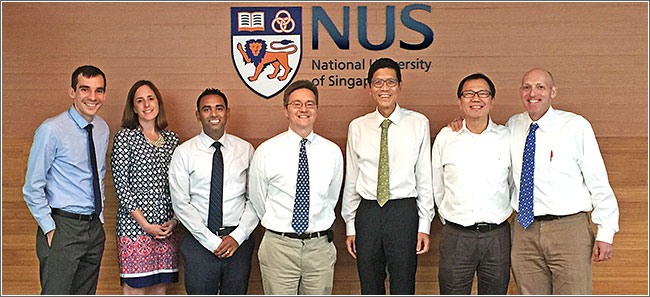News
LDI CHIBE Signs Singapore Research Partnership
Work to Focus on Population Behavioral Economics Studies

In a new international partnership, the University of Pennsylvania’s LDI Center for Health Incentives and Behavioral Economics (CHIBE) and the National University of Singapore (NUS) will jointly conduct a series of behavioral economics studies.
Finalized in a Singapore meeting of scientists from both organizations earlier this month, the agreement is the second international research partnership for CHIBE. In 2013 it began ongoing studies with South Africa’s Vitality Group that manages corporate wellness programs with more than 6 million employees worldwide.
NUS is, according to the United Kingdom’s QS World University Rankings, the top university in Asia. It maintains a number of other international collaborations including the Duke-NUS Graduate Medical School; Yale/NUS, a college in Singapore jointly run by Yale and NUS; and the “NUS Overseas” program that includes partnerships with Stanford and NYU Polytechnic in the U.S. and other schools in France, Germany, Sweden, China and Israel.
Collaborative research
CHIBE Director Kevin Volpp said “The similarity between the issues faced in Singapore and in the US in terms of switches in provider payment toward value and concerns about the role of non-communicable diseases such as obesity and diabetes as a major driver of health costs and poor outcomes is remarkable. We are excited about the possibility of this collaboration.”
Volpp, MD, PhD, is also a professor of both Medicine at Penn’s Perelman School of Medicine and Health Care Management at The Wharton School; and Vice Chair of Penn Medicine’s Department of Medical Ethics and Health Policy.

The new CHIBE/NUS project will launch a number of pilot studies in various areas of population health including better management of diabetes, medication adherence, the promotion of healthier lifestyles, and the use of wearable monitoring devices for chronic disease management.
Diabetes management
The issue of diabetes management is particularly important in the project because, much like the U.S., Singapore has a rapidly aging population and surging numbers of diabetics. The International Diabetes Federation (IDF) reports there were 541,600 cases of adult diabetes in Singapore in 2015 — or about 12.8% of the city-state’s population. The IDF also estimated there were an additional 253,800 cases of adult diabetes that weren’t diagnosed.
One of the CHIBE/NUS pilot studies will explore the potential for deploying the “Question Disclosure Model” of clinician-patient communications in a diabetes treatment setting. This involves the phrasings and question structures used by a physician to elicit emotionally sensitive information from a patient about behaviors like medication non-adherence.
The goal of the method — which uses positive, negative or neutral phrasing based on the work led by Wharton Professor of Operations and Information Management, Maurice Schweitzer, PhD — is to more systematically draw out accurate responses without alienating the patient’s trust. Although used in the consumer research field with potentially broad implications in other contexts like provider-patient interactions, the “Question Disclosure Model” concept has not to date been tested in clinical settings.
“The information we learn from others is profoundly influenced not only by what we ask but also by how we ask the question. This project — in a setting characterized by high non-compliance rates — seeks to understand how asking different questions in different ways can help clinicians glean critical information from their patients,” said Schweitzer. “The insights we gain from this are likely to be of importance in Singapore as well as the U.S.”
Related Articles
Penn Nursing in China: Science vs. Shortages
How a Small School’s Faculty is Making an Outsize Impact